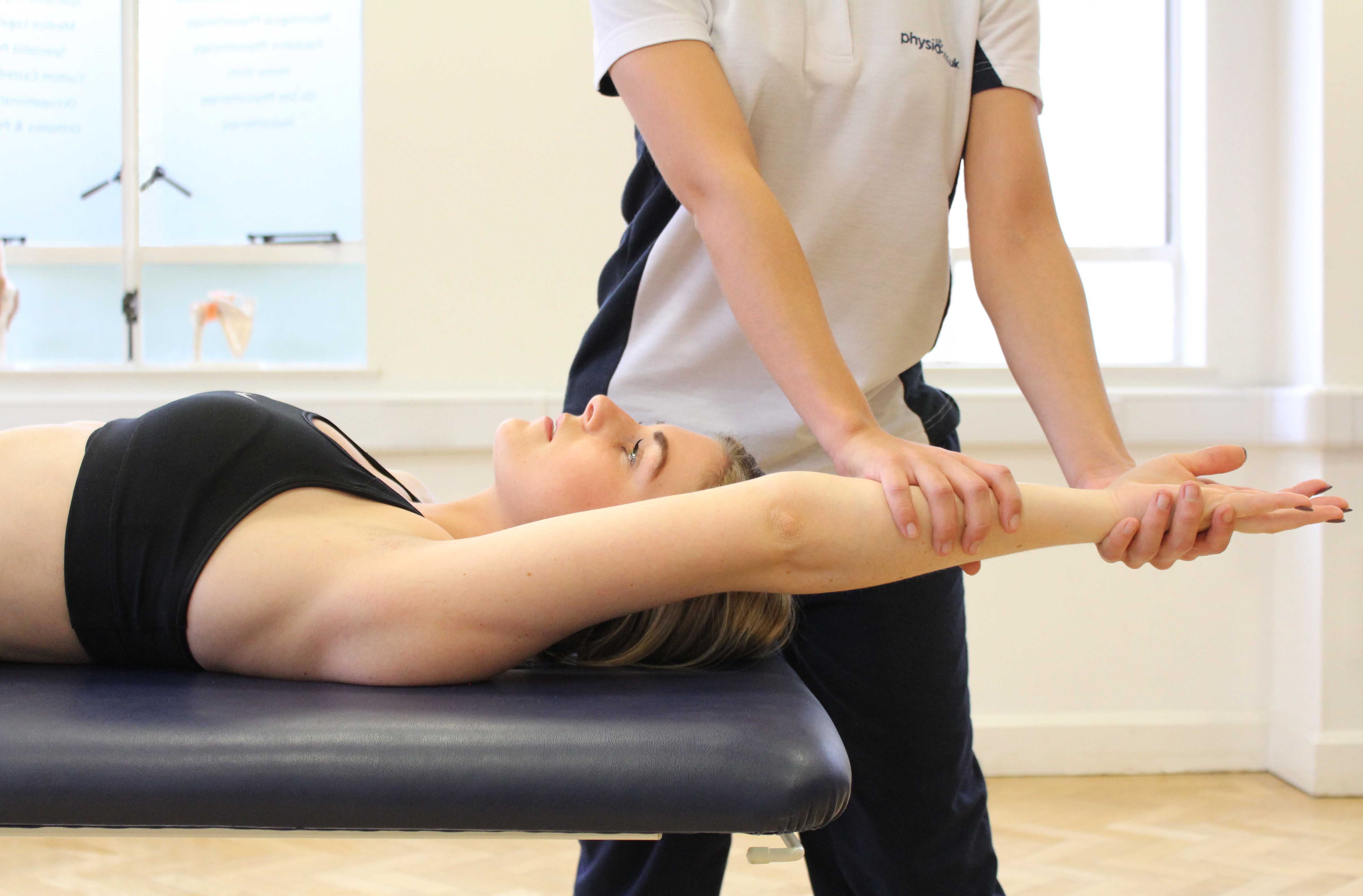What is a dislocated shoulder?
A dislocation of the shoulder joint is when the top of the arm bone comes out of and stays out of its socket. Physiotherapy can successfully resolve the symptoms of a dislocated shoulder.
 Above: Passive stretch applied to the shoulder by experienced physiotherapist
Above: Passive stretch applied to the shoulder by experienced physiotherapistHow does a dislocated shoulder happen?
The top of the arm bone may be caused to ‘pop out’ or dislocate when forces acting on the shoulder joint are too great for the supporting muscles and ligaments to resist. A dislocation of the shoulder commonly occurs if you land on an outstretched hand or with a direct blow to the shoulder joint. Both of these can push the ball-shaped top of the arm bone out of its socket.
What are the symptoms of a dislocated shoulder?
The immediate sensation felt when the shoulder is dislocated is intense pain. This is usually felt all over the shoulder and sometimes down the arm. The intense pain usually causes you to cradle your arm against your body with your other arm. At the time of injury you may have also felt the shoulder ‘popping out’. Other symptoms include:
What should I do if I have a dislocated shoulder?
A shoulder dislocation is a serious injury which requires immediate medical attention. If you have or suspect you have dislocated your shoulder you should go directly to your nearest accident and emergency department. To help with your pain and reduce and control any swelling you can also apply ice to the shoulder. Ideally, this should be in the form of crushed ice wrapped in a moist towel or cloth applied for up to 20 minutes.
Physiotherapy treatment for a dislocated shoulder.
After your shoulder has been relocated, the assistance of a physiotherapist is important in the rehabilitation of your shoulder. They can assess which tissues have been damaged and the extent of this damage. The physiotherapists at Physio.co.uk will be able to provide you with a determination of how long the injury is expected to take to heal. During your recovery, they will be able to assist in reducing your pain and promoting your recovery. This will usually involve wearing a sling for the first few weeks followed by progressing you through a progressive series of strengthening and stability exercises designed to return you back to participation and reduce the risk of ongoing shoulder dislocations.
Other physiotherapy techniques include:
What shouldn’t I do if I have a dislocated shoulder?
If you have or suspect you have dislocated your shoulder, the main thing you shouldn’t do is try to ‘reduce’ or relocate the top of the arm bone back into its socket by yourself. This requires the assistance of a professional. If not done properly serious damage may be done to other structures resulting in irreparable damage and/or a longer recovery time. In addition, you shouldn’t undertake any activities which increase blood flow to the injured site immediately after the injury. These include hot showers, heat rubs, the consumption of alcohol and massage. These will cause further swelling in the damaged tissues resulting in a prolonged recovery.
Are there any long-term effects following a dislocated shoulder?
The most common of long term effect is frequent shoulder dislocations. When the shoulder joint is dislocated, the tissues which support it are overstretched and in some cases torn. This makes the joint less stable and, therefore, it can dislocate again much more easily. Occasionally, when the shoulder joint is dislocated, nearby nerves may also be damaged. This can result in numbness or altered sensation over the outside of the shoulder and sometimes weakness in the shoulder muscles. This can prolong your recovery. Similarly, recovery may be prolonged if a bone is fractured or broken as the shoulder dislocates.
To arrange a physiotherapy assessment call Physio.co.uk on 0330 088 7800 or book online today.

 0330 088 7800
0330 088 7800

































